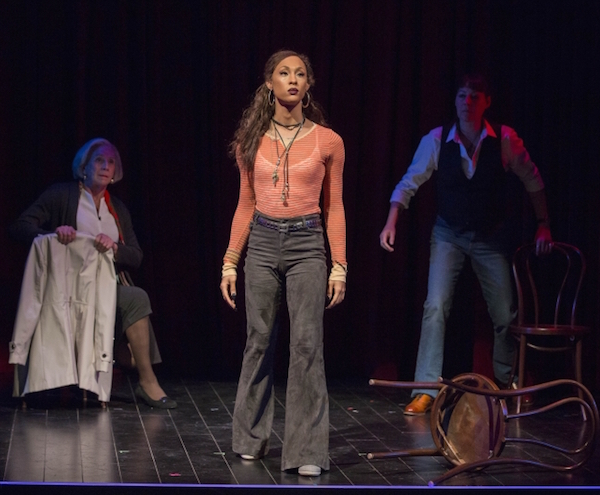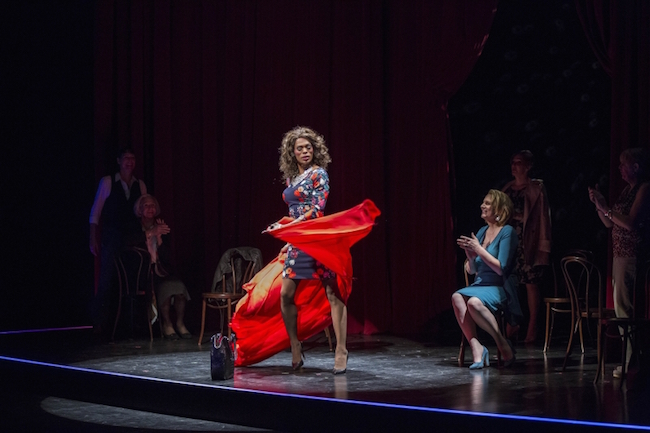Theater Review: “Trans Scripts, Part I: The Women” — An Evening of Powerful Journeys
Paul Lucas has crafted a script with an exquisite sense of balance; Trans Scripts, Part I is thoughtful, informative, honest, and playful, all at once.
Trans Scripts, Part I: The Women by Paul Lucas. Directed by Jo Bonney. Staged by the American Repertory Theater at the Loeb Drama Center, Cambridge, MA, through February 5.

Jack Wetherall (Dr. Violet), MJ Rodriguez (Luna) and Rebecca Root (Eden) in Trans Scripts, Part I: The Women. Photo: Gretjen Helene Photography.
By Jess Viator
When Paul Lucas conceived Trans Scripts, he did so with the intention to dispel the notion that there is “one trans narrative.” In an interview with ART Artistic Director Diane Paulus at a reading of the script in July of 2016, Lucas explained that for decades transpeople did not have control of their own narrative. They would seek care from the medical and psychiatric community, who would only provide them with hormone and surgical treatments if their “symptoms” matched the extremely narrow medical definition of gender identity disorder (now called gender dysphoria). For the sake of receiving the help they desperately needed, transpeople learned to shape their stories to fit the cramped narrative the medical gatekeepers wanted to hear. That formulaic story has been perpetuated, ad infinitum.
Thus the iconoclastic intent of Trans Scripts Part I: The Women. Each of the seven characters has a distinctive story to tell, but Lucas shrewdly ties them all together by breaking the play into parts and titling each section after one of the stages in Joseph Campbell’s monomyth, also known as the Hero’s Journey. The latter is the archetypal narrative structure Campbell identifies as the essential underlying pattern in most western myths and tales. The Hero’s Journey template eliminates the ‘othering’ that tends to occur when transpeople tell their stories: the approach has the merit of showing how universally human these personal journeys are, while it also highlights each tale’s distinctiveness, offering a framework in which each individual’s story can be compared and contrasted.
Trans Scripts Part I: The Women begins very simply, with the seven actors siting on an unadorned stage on a row of bentwood chairs. Each woman directly addresses the audience while she describes her life experiences. They take turns; each tells a snippet of a story illustrating a stage in her journey, and then another will jump in and tell a bit of their narrative, and so on, until you get all 7 stories told in harmony. A pervasive trope in mass media has LGTBQ people either dying or suffering grievously (TV Tropes calls it “Bury Your Gays”). Given that cliche, I was anticipating a grim focus on the pain that these women had endured. But I had forgotten an important element in the making of this work: Lucas’ script is based on interviews with transpeople. There is no tragedy for tragedy’s sake here; each character lays her soul bare while maintaining a remarkable sense of humor.
The play does explore some upsetting truths; each of these women has suffered abuse—by parents, by doctors and therapists, by strangers on the street. Some of them have led very difficult lives: they’ve turned to drugs and/or sex work, embraced self-destruction, have attempted suicide. They remind us that trans suicide rates are astronomically high, and that transwomen of color are murdered more than any other demographic. The characters are blunt about these realities, but a wry optimism prevails throughout.
The breakout performance in Trans Scripts Part I: The Women goes to Rebecca Root, whose portrayal of Eden epitomizes the play’s frank but amusing sensibility. Of all of the journeys chronicled in Trans Scripts, Eden’s path is probably the most arduous, and where she ends up is the least hopeful. These gritty challenges give Root excellent dramatic material to work with, and she does not shy away from it. Root manages to maintain Eden’s slow burn — a manifestation of her underlying melancholy and bitterness — while still being charming — her lively sense of humor is omnipresent. Matthew Hancock as Zakia and Bianca Leigh as Tatiana also also compelling performers who make good use of their wicked comedic timing. Although MJ Rodriguez as Luna feels a little more timid than some of the other cast members, boy does she bring a raw, earnest quality to her portrait.

Matthew Hancock (Zakia) and the company of Trans Scripts, Part I: The Women. Photo: Gretjen Helene Photography.
Each major stage in the journeys of the characters is introduced with a title card projected above the playing space; the staging becomes more elaborate with each progressive step. The cast members start off sitting in chairs, then begin to stand and move about. Eventually, the performers act out dramatic vignettes, taking on the supporting roles in the featured character’s anecdote. By the time we reach “The Belly of the Beast” stage (where the figures fully abandon their old selves and embrace their transformations), the supporting characters are kicking over the chairs and using them as props to illustrate the action. At this point, Lap Chi Chu’s lighting and John Gromada’s music and sound design come into their own: their subtle evocation of mood dovetail precisely with Jo Bonney’s agile staging. The lighting and sound effects are initially almost imperceptible, until the arc of the collective stories finally ramp up, and suddenly you feel like you are in the midst of a protest, police lights flashing, rioting happening all around you on the streets of New York City. The production’s gradual and fluid approach to transition — first telling you a story and then immersing you in the action — is impressively effective.
I know I have emphasized the funny and poignant personal-ness of Trans Scripts. But the play also contemplates what it means to be transgender in a macro sense. Its seven characters — diverse in terms of race, economic status, class, and age — argue about terminology, their preferred mode of presentation (which includes a very contentious discussion on gender reassignment surgery), and participation in sex work. Given the range of the personal and the political here, Lucas has crafted a script with an exquisite sense of balance; the piece is thoughtful, informative, honest, and playful, all at once. I am a cis-gendered woman, so take my opinion with the requisite grain of salt: Lucas dramatizes the unique stories of transwomen in a throughly enjoyable way.
Jess Viator is an emerging independent theater director, an occasional stage manager, and a lapsed playwright. She has a BA in theater performance, and recently completed a master’s degree in theatre studies from the University of Dundee in Scotland.
Tagged: American Repertory Theater, Diane Paulus Trans Scripts, Jess Viator, Jo Bonney, Part I: The Women, Paul Lucas, Rebecca Root
